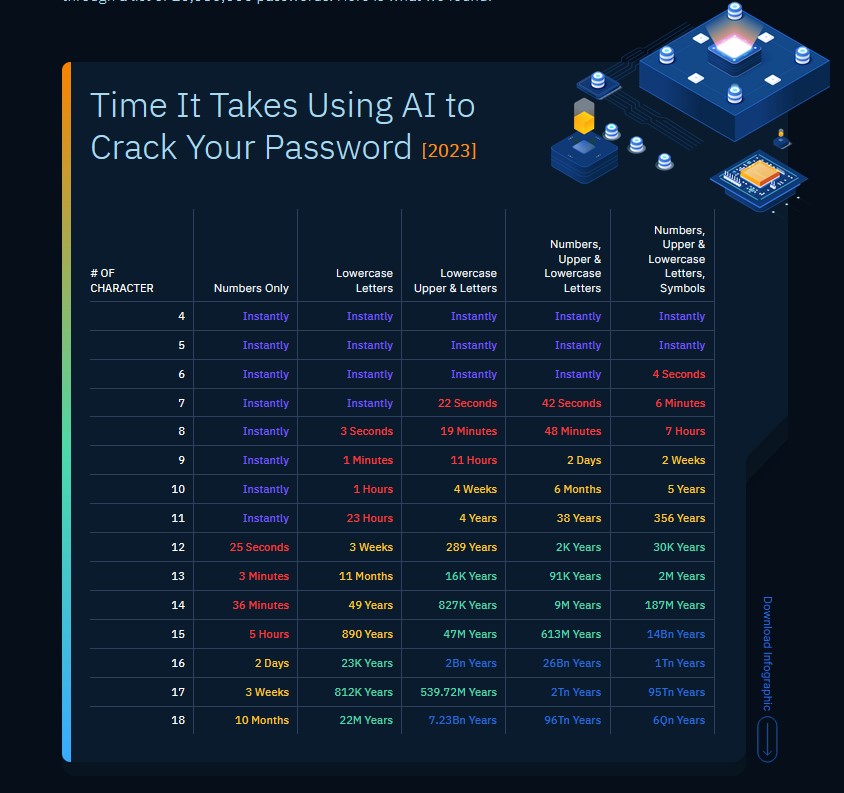
In the ever-evolving world of cryptocurrency, there is always something new and exciting happening. From the development of pocket AI by Apple to the mesmerizing capabilities of GPT-4, the AI Eye product offers a glimpse into the latest advancements in the industry. Meanwhile, the global cryptocurrency market experiences a range of fluctuations and developments with potential impacts on Bitcoin’s price. Grayscale CEO emphasizes the importance of balanced regulation, Brazil’s Congress considers higher taxes on cryptocurrencies, and the US government’s debt downgrade raises concerns. As Bitcoin’s price reaches new highs and lows, the SEC delays its decision on a Bitcoin ETF, major cryptocurrencies face stability, and a US bank reveals significant crypto holdings. With ongoing discussions and analyses surrounding factors affecting Bitcoin’s movement, such as the upcoming CPI report in the US, the crypto world remains an exciting and dynamic space to watch.

This image is property of cointelegraph.com.
AI Eye: Apple developing pocket AI
Apple working on pocket-sized AI device
Apple is reportedly in the early stages of developing a pocket-sized AI device that would integrate its voice assistant, Siri, with advanced machine learning capabilities. The device would aim to enhance user experience and convenience by providing quick access to AI features on the go. This development is in line with Apple’s focus on incorporating AI technologies into its product lineup.
Device to integrate Siri and advanced machine learning
The pocket AI device being developed by Apple would bring together the power of Siri and advanced machine learning capabilities. This integration would enable users to access a wide range of AI-driven functions, such as voice recognition, natural language processing, and personalized recommendations. By leveraging machine learning algorithms, the device would continuously learn from user interactions and provide tailored responses and assistance.
Focus on privacy and data security
As with all of its products, Apple places a strong emphasis on privacy and data security. The pocket AI device would be designed with robust security features to protect user data and ensure confidentiality. Apple’s commitment to privacy would be extended to the AI capabilities of the device, ensuring that user interactions and personal information are safeguarded.
Potential impact on user experience and convenience
The development of a pocket AI device by Apple has the potential to significantly enhance user experience and convenience. By combining Siri’s voice assistant functionality with advanced machine learning, users would have access to a wide array of AI-powered features in a compact and portable form. This would enable seamless integration of AI technologies into daily life and streamline tasks such as voice commands, personalized recommendations, and information retrieval.
Deep fake music deal
Deep fake technology enters the music industry
Deep fake technology, which allows for the creation of artificially generated content that mimics human performance, has started to make its way into the music industry. This technology can create virtual performances that are indistinguishable from those of real musicians, blurring the lines between authenticity and artificiality.
Artificially generated music performances
With deep fake technology, it is now possible to generate music performances that closely resemble those of real musicians. These performances can be created using algorithms and machine learning techniques that analyze and replicate the unique style and characteristics of a particular artist. This allows for the creation of new music content even in the absence of the artist.
Controversy surrounding authenticity and creative integrity
The introduction of deep fake music performances has sparked controversy in the music industry. Critics argue that this technology undermines the authenticity and creative integrity of music, as it allows for the replication of an artist’s style without their direct involvement. The use of deep fake music performances raises questions about the role of artists and the boundaries of creativity.
Legal and ethical implications
The rise of deep fake music performances also raises legal and ethical concerns. The use of copyrighted material and the potential for misrepresentation pose challenges in terms of intellectual property rights and artistic control. Additionally, there is the risk of using deep fake technology to manipulate or deceive audiences, which raises ethical concerns regarding the boundaries of artistic expression and the impact on audience trust.

This image is property of cointelegraph.com.
Hypnotizing GPT-4
Introduction of GPT-4
GPT-4, the fourth generation of OpenAI’s language model, has been introduced with several new features aimed at enhancing user engagement. One of the most notable features is its “hypnotic” capabilities, which have the potential to revolutionize marketing and entertainment industries.
Hypnotic features for enhanced user engagement
GPT-4’s hypnotic features leverage advanced natural language processing and machine learning techniques to captivate and engage users. These features enable GPT-4 to create highly persuasive and compelling content, tailored to individual users’ preferences and interests. By generating content that resonates with users on a deep emotional level, GPT-4 aims to enhance user engagement and drive desired behaviors.
Possible applications in marketing and entertainment
The introduction of hypnotic features in GPT-4 opens up a wide range of possibilities in the fields of marketing and entertainment. Marketers can leverage GPT-4’s capabilities to create highly personalized and persuasive content that drives customer engagement and conversion. In the entertainment industry, GPT-4 can be used to create immersive and captivating narratives that resonate with audiences, enhancing the overall entertainment experience.
Unintended consequences and potential risks
While the hypnotic features of GPT-4 present exciting opportunities, there are also potential risks associated with their use. The ability to manipulate user emotions and behaviors raises concerns regarding the ethical implications of using AI in such a manner. It is crucial to establish clear guidelines and ethical frameworks to ensure responsible and transparent use of hypnotic features to mitigate any unintended consequences.
Grayscale CEO emphasizes balanced regulation in cryptocurrency
Importance of balanced regulation in fostering innovation
Grayscale CEO, Michael Sonnenshein, emphasizes the importance of balanced regulation in the cryptocurrency industry. While regulations are necessary to protect investors and maintain market integrity, excessive and burdensome regulations can stifle innovation and hinder the growth of the industry. Sonnenshein highlights the need for regulations that strike a balance between consumer protection and industry growth.
Potential risks of excessive regulation
Excessive regulation in the cryptocurrency industry can have adverse effects on innovation and market development. Overly restrictive regulations can deter businesses from entering the market, limiting competition and stifling innovation. Moreover, burdensome compliance requirements can result in increased costs for businesses, hindering their ability to operate efficiently and effectively.
Need for clarity and collaboration between regulators and industry
To strike the right balance, there is a need for clarity and collaboration between regulators and the cryptocurrency industry. Clear regulatory frameworks that provide guidance and certainty can foster innovation while ensuring consumer protection. Collaboration between regulators and industry participants can lead to the development of effective regulatory measures that address the unique challenges and characteristics of the cryptocurrency market.
Balancing consumer protection and industry growth
Achieving the right balance between consumer protection and industry growth is crucial for the long-term success of the cryptocurrency industry. By implementing balanced regulations, regulators can instill trust and confidence in the market, attracting more participants and investment. Simultaneously, the industry can continue to innovate and grow, driving economic development and providing new opportunities for individuals and businesses.

This image is property of cointelegraph.com.
Brazil considers higher taxes on cryptocurrencies
Proposed increase in taxes on cryptocurrencies
Brazil’s Congress is considering a proposal to increase taxes on cryptocurrencies, including assets held by Brazilians overseas. The proposed tax increase aims to generate additional revenue for the government and regulate the cryptocurrency market. If implemented, this tax policy could have significant implications for individual investors and businesses involved in the cryptocurrency space.
Implications for individual investors and businesses
The increase in taxes on cryptocurrencies can impact individual investors and businesses in Brazil. Higher taxes may reduce the profitability of cryptocurrency investments and discourage individual investors from participating in the market. For businesses operating in the cryptocurrency space, increased tax burdens can affect profitability and financial viability, potentially leading to a slowdown in innovation and growth.
Challenges of enforcing taxes on assets held by Brazilians overseas
Enforcing taxes on assets held by Brazilians overseas poses significant challenges for the government. The decentralized nature of cryptocurrencies and the global nature of the cryptocurrency market make it difficult to track and regulate assets held by Brazilians in foreign jurisdictions. Overcoming these challenges would require international cooperation and effective enforcement mechanisms.
Effect on the growth and adoption of cryptocurrencies in Brazil
The proposed increase in taxes on cryptocurrencies may have implications for the growth and adoption of cryptocurrencies in Brazil. Higher taxes can deter individuals and businesses from entering the market or conducting cryptocurrency transactions. Additionally, the increased regulatory burden may create uncertainty and hinder the development of a robust cryptocurrency ecosystem in the country.
Bitcoin price predictions and market analysis
Analysts predict bottoming out of Bitcoin price
Analysts in the cryptocurrency market predict that the price of Bitcoin has bottomed out after a period of consolidation. The market has experienced a significant decline in Bitcoin’s price in recent months, but many analysts believe that the worst is over and anticipate a potential price recovery in the near future.
Caution against weekend volatility and ongoing price action
While analysts predict a potential bottoming out of Bitcoin’s price, they caution against the volatility typically seen during weekends and ongoing price action. Weekend trading volumes tend to be lower, making the market susceptible to greater price fluctuations. Additionally, ongoing price action and market sentiment can influence short-term price movements, highlighting the need for caution and careful analysis.
Impact of US government debt downgrade on Bitcoin
The recent downgrade of the US government’s debt rating could have a negative impact on the price of Bitcoin. Bitcoin has been seen as a hedge against traditional financial systems, and a downgrade in the US government’s creditworthiness may further strengthen this perception. As a result, investors may turn to Bitcoin as a store of value, potentially driving up demand and, consequently, its price.
Stable or slightly declining prices of major cryptocurrencies
In recent market conditions, major cryptocurrencies like Bitcoin and Ethereum have experienced stable or slightly declining prices. This stability may be attributed to a period of consolidation after significant price declines and the market’s search for a new equilibrium. While short-term price movements can be influenced by various factors, the overall market trend for major cryptocurrencies has been relatively stable.

This image is property of i-invdn-com.investing.com.
Discover the secret crypto strategies that experts don’t want you to know.
Bitdeer reports widening losses in Q2
Bitcoin mining company faces increasing losses
Bitdeer, a prominent Bitcoin mining company, has reported widening losses in the second quarter (Q2) of this year. Despite the growing popularity of Bitcoin mining, mining companies have faced numerous challenges, including increased competition and rising operational costs. Bitdeer’s financial performance reflects these industry-wide difficulties.
One-time listing fee and rising share price
Bitdeer’s financial performance in Q2 was impacted by a one-time listing fee associated with going public. While the fee resulted in short-term losses, Bitdeer’s share price has been on the rise. This increase reflects the market’s confidence in the long-term potential of the company and the broader Bitcoin mining industry.
Factors contributing to financial performance
Several factors have contributed to Bitdeer’s widening losses in Q2. Increased competition in the Bitcoin mining industry has resulted in reduced profit margins and decreased mining efficiency. Rising operational costs, including electricity and hardware expenses, have further strained the company’s financials. These challenges highlight the need for mining companies to continually innovate and optimize their operations.
Market outlook and potential strategies for improvement
Bitdeer’s financial performance in Q2 reflects the broader challenges faced by the Bitcoin mining industry. However, the rising share price indicates market confidence in the long-term prospects of the company. To improve financial performance, mining companies must focus on enhancing mining efficiency, reducing operational costs, and exploring new revenue streams, such as the provision of mining services to external clients.
SEC delays decision on Bitcoin ETF
Significance of SEC’s decision on Bitcoin ETF
The US Securities and Exchange Commission (SEC) has announced a delay in its decision regarding a Bitcoin exchange-traded fund (ETF). The approval of a Bitcoin ETF by the SEC is seen as a significant milestone in the broader adoption of cryptocurrencies. Investors and market participants closely monitor the SEC’s decision as it has the potential to shape the future of the cryptocurrency market.
Dependence on regulatory approval for broader adoption
The delay in the SEC’s decision highlights the dependence of the cryptocurrency market on regulatory approval for broader adoption. A Bitcoin ETF would provide institutional investors with a regulated and accessible avenue for investing in Bitcoin, potentially attracting a significant influx of capital into the market. The SEC’s decision, therefore, holds considerable influence over market sentiment and investor confidence.
Impact on cryptocurrency market and investor sentiment
The SEC’s delay in deciding on a Bitcoin ETF can have implications for the cryptocurrency market and investor sentiment. The announcement prolongs the period of uncertainty and may contribute to market volatility. Moreover, the delay may create a sense of hesitation among investors, potentially slowing down the pace of investment and adoption in the cryptocurrency space.
Parallel appeal in the Ripple case
Coinciding with the delay in the Bitcoin ETF decision, the SEC has also appealed the Ripple case. This parallel legal battle adds another layer of complexity and uncertainty to the regulatory landscape surrounding cryptocurrencies. The outcome of the Ripple case has the potential to significantly impact the regulatory environment for cryptocurrencies and shape future SEC decisions.

This image is property of i.ytimg.com.
Missed out on the Bitcoin boom? Our latest crypto guide reveals the next big thing.
Bitcoin Lightning Network shows growth and challenges
Expansion and development of Bitcoin Lightning Network
The Bitcoin Lightning Network, a second-layer scaling solution for the Bitcoin blockchain, has seen significant growth and development. The Lightning Network allows for faster and cheaper transactions by allowing users to create payment channels off the main blockchain. This scalability solution has attracted attention and investment, leading to an expansion of its network and capabilities.
Challenges of liquidity and user awareness
While the Bitcoin Lightning Network has shown promising growth, it still faces challenges in terms of liquidity and user awareness. Liquidity refers to the availability of funds within the Lightning Network channels, which can impact the network’s capacity and usability. User awareness is another crucial factor, as the Lightning Network’s adoption relies on widespread understanding and usage.
Potential solutions and future prospects
Efforts are underway to address the challenges faced by the Bitcoin Lightning Network. Innovations such as submarine swaps, which allow users to exchange cryptocurrencies across different layers of the Bitcoin network, can improve liquidity and scalability. Additionally, educational initiatives and user-friendly interfaces can increase user awareness and adoption, further enhancing the growth and potential of the Lightning Network.
Implications for Bitcoin’s scalability and usability
The growth and development of the Bitcoin Lightning Network have significant implications for Bitcoin’s scalability and usability. By enabling faster and cheaper transactions, the Lightning Network addresses some of the scalability issues associated with the main Bitcoin blockchain. As the Lightning Network expands and matures, it has the potential to enhance Bitcoin’s use as a medium of exchange and improve its overall utility.
US CPI report impact on Bitcoin
Upcoming CPI report in the US
The release of the upcoming Consumer Price Index (CPI) report by the US Bureau of Labor Statistics is anticipated to have an impact on the price of Bitcoin. The CPI report measures changes in the prices of a basket of goods and services, serving as a key indicator of inflation in the US. Any significant deviation from expectations in the CPI report could affect investor sentiment and market dynamics.
Potential impact on Bitcoin price
The CPI report has the potential to impact the price of Bitcoin, primarily due to Bitcoin’s perceived value as an inflation hedge. If the CPI report indicates a higher-than-expected level of inflation, it may bolster the narrative that Bitcoin can serve as a store of value and protection against inflation. This perception could drive increased demand for Bitcoin and potentially lead to an uptick in its price.
Relationship between inflation and cryptocurrency
Inflation and cryptocurrencies, including Bitcoin, have a complex relationship. While inflation can erode the purchasing power of traditional fiat currencies, cryptocurrencies offer the potential for a decentralized and inflation-resistant alternative. As a result, inflation trends, as reflected in reports like the CPI, can influence market sentiment and investment decisions in the cryptocurrency space.
Market reaction and investor sentiment
The market’s reaction to the CPI report and subsequent investor sentiment can have a significant impact on the price of Bitcoin. Positive market sentiment, driven by expectations of higher inflation, can drive increased demand for Bitcoin and push its price higher. Conversely, negative sentiment or a lower-than-expected level of inflation may dampen investor enthusiasm and put downward pressure on Bitcoin’s price.
Why are Wall Street elites terrified of this new crypto guide? Unveil the game-changing info.



